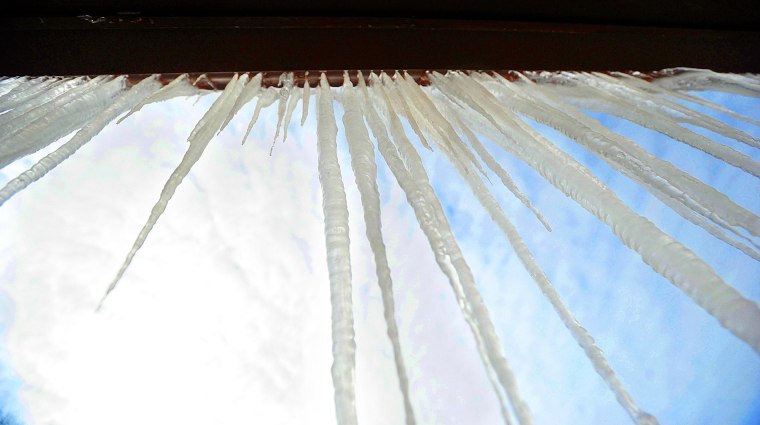Sure, they're beautiful. But they can also be heavy projectiles.
If you're one of the millions of Americans socked in by this winter's serial snowstorms, the approach of warmer weather must be welcome. But be careful what you wish for. All of that snow and ice has to go somewhere when it melts — and that means monster icicles.
"Certainly, a business or a home with icicles forming over a walkway or an entryway, they are a hazard," said Dan Sincock, deputy fire chief of Elmira, N.Y.
While it's rare, it is possible for icicles — which can grow to 2 feet long and balloon to 30 pounds as they thaw and refreeze — to come crashing down on your head, Sincock told NBC station WETM.
There are no reliable statistics on deaths caused by falling icicles, but records of the Centers for Disease Control and Prevention do cite a handful of such incidents over the last couple of decades, most recently in February 2010 in Follansbee, W.Va., when a large icicle broke off a coal conveyer belt and crushed a worker.
And news reports catalog at least two injuries last month — one of them a jewelery shop worker who was slashed in the face by a falling icicle in New York City and the other a woman who was injured after an icicle fell on her head in Arlington Heights, Ill.
Even more common is expensive property damage.
If you don't know what you're doing — and most people don't — "you're going to damage your roof, rip shingles off and cause a bigger problem," Ed Love, program manager for Michigan Energy Options, a nonprofit conservation group in East Lansing, Mich., told NBC station WILX of Lansing.
So what do you do?
"You're going to want to take a broom — maybe a roof rake — and stand away as best you can and brush across them to knock them down," Robert Ferrier, a fire lieutenant in Agawam, Mass., told NBC station WWLP of Springfield.
"We don't want you looking up," he said.
